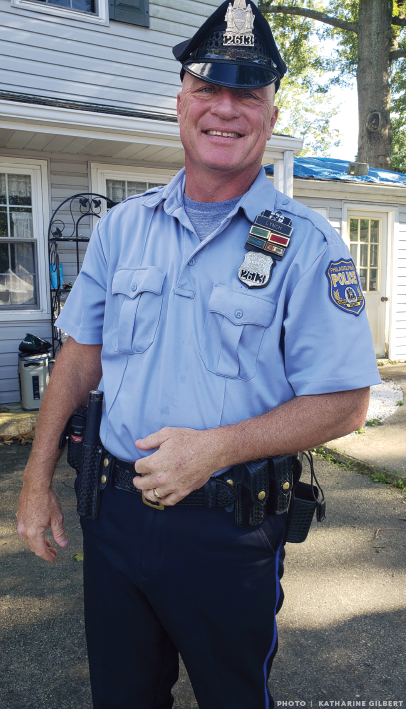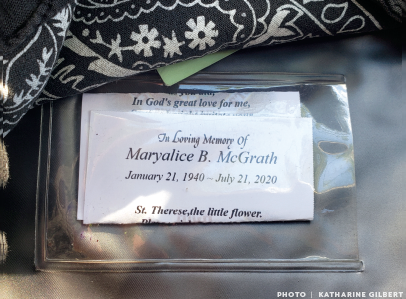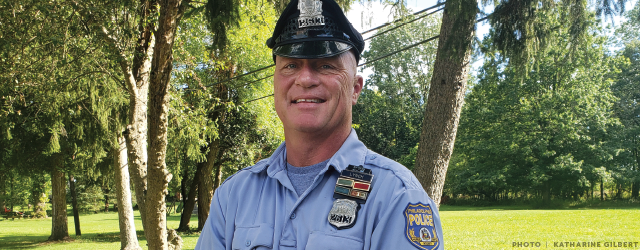By Kathy McGee Burns
Almost a year ago I started a series on Heroes. It consisted of Heroes whom I personally admire. A hero is a person who is idealized for courage and noble qualities. A Hero can be portrayed in a book, play, film or story. Some of the Heroes I have written about are:
Sean McMenamin, who decided ten years ago to dedicate his time and efforts to restructuring and stabilizing the Irish Center.
Sister Conchita McDonald, an Irish Nun, who has spent her life in Africa teaching young women.
Peggy Dolan, who founded the Kelly Ann Dolan Memorial Fund, the day after her young daughter died of leukemia, which helps young families.
Frank Lynch is a different kind of hero. He came at a time when we all needed one . We, in America, are divided, isolated, full of anxiety and fear for our futures. We wonder who our friends are and who are our foes. The beliefs we once held close to our hearts have been decimated/fragmented…and then out of nowhere, Frank Lynch appears…
“I wished I could have helped you more.”
It was a normal day, July 21, around noon. Frank Lynch, age 48, a Philadelphia policeman, who is with the Neighborhood Service Unit, was driving behind a large truck. The driver was trying to make a right-hand turn when Frank heard a crashing sound. “I looked into my side mirror and saw an older woman laying there apparently lifeless.”
He immediately called for backup and an ambulance. He could see that the woman, who was later identified as Maryalice McGrath had severe injuries. He went down on his hands and knees and started to talk to her. Her injuries were devastating and she should have been in a lot of pain but there were no tears or screaming. “The whole time she was gripping my hand,” he said.
He asked her name and reassured her that help was on the way. It was in the mid-90’s and the asphalt was burning. He quickly ran back to his car to get water which he put on her head and body. Twenty or thirty minutes later the medic unit arrived, and they rushed Maryalice to Temple Hospital. Frank was so immersed in helping her, he did not realize that he was suffering from heat exhaustion and burns all over his arms. He said, “At that time I had a higher priority.”

He was then taken to Temple also where his wife, Megan, who is a police sergeant for the District Attorney’s office in Philadelphia, was waiting for him. Right away Frank asked for Maryalice only to find out that she died of her injuries.
The story doesn’t end there. Frank and Megan Lynch went to Maryalice’s funeral. It was held at the Nativity BVM Church and it was an open casket. Frank said, “She looked beautiful.” As he stood at her side, said a prayer and he silently whispered to her, “I wished I could have helped you more.”
It was there he realized the impact of his actions. The family gathered round him thanking him for his heroic act and his kindness to Maryalice. The press wanted interviews and the police department was beaming with pride.
When I heard this news, it lightened my heart and gave me new faith in humanity. But…when I realized that I actually knew him and his parents I was doubly impressed.
Frank Lynch grew up in Plymouth Meeting and went to St. Phillip Neri School with some of my sons. I had met his parents, Jim and Katie Lynch many times at Irish functions. Frank is the youngest of the family with four sisters — Beth, Carol, Lori and Erin. He and Megan nee Scally bought the family home and live there with their three children: Clancy,18, Molly,16 and Frank Jr. age 14.
I asked Frank how he was dealing with his experience. He said it is impossible not to think about it. He felt anxious and upset that he couldn’t do more for Maryalice. He still gets choked up. “An 80-year-old woman is supposed to die in bed not on a hot asphalt street.”

The driver of the truck was not charged in Maryalice’s death. It was deemed an accident. It is a testament to Frank’s empathy that, although at the scene he was focused on the woman’s plight, he also noticed that the truck driver was so distraught that he was standing there, in disbelief, pulling at his hair. He asked another officer at the scene to comfort the man.
Since 1928, a policeman’s cap, worn by the city police, conceals a plastic sleeve on the inside top, in which Officers traditionally tuck photos and small personal treasures. They are usually family pictures, keepsakes and in Frank Lynch’s case…Maryalice McGrath’s Mass Card.

